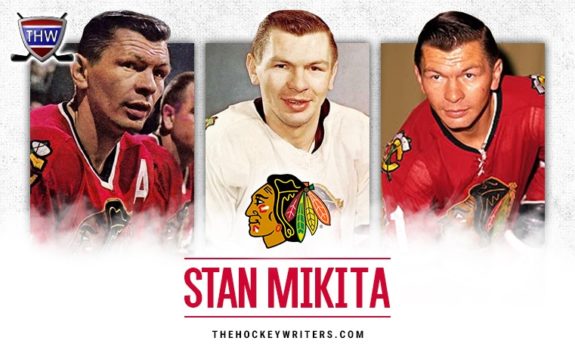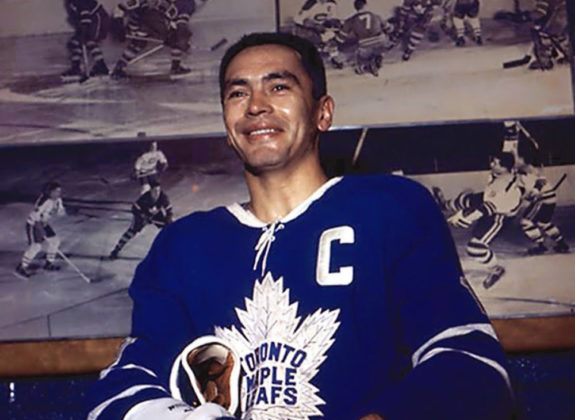On Aug. 7, 2018, the hockey world lost one of its greatest ambassadors and the city of Chicago lost one of its biggest sports legends. Stan Mikita passed away at age 78. His legacy will be remembered by Chicago Blackhawks fans for generations to come.
Stan Mikita Belongs on the Mount Rushmore of Chicago Sports
The City of Chicago has a long and storied sports history. Throughout the years a number of professional athletes have become icons. The Bears have Walter Payton, the Bulls have Michael Jordan, the Cubs have Ernie Banks and the White Sox have Frank Thomas. For the Blackhawks, it’s Stan Mikita.
Born in present-day Slovakia, Mikita moved to St. Catharines, Ontario at a young age where he was adopted by his aunt and uncle, Anna and Joe. He became a star in the Ontario Hockey Association before making his National Hockey debut in 1959. His career lasted until chronic back injuries led to his retirement during the 1979-80 season.

Mikita rewrote the Blackhawks record book over the course of his amazing 22-year career. He is the all-time franchise leader in points (1,467), assists (926), games played (1,396) and plus/minus (329). He is second in goals (541), even-strength goals (379), game-winning goals (84), hat tricks (15), shots (4,482) and is third all-time in power-play goals (150).
These are not only the type of numbers that get you elected to the Hockey Hall of Fame in your first year of eligibility, but they also get you a statue on Madison Street.
The Standard is Set in Chicago
Decades before Patrick Kane and Jonathan Toews became the faces of the “golden age” of Blackhawks hockey, Mikita formed a legendary one-two punch with Bobby Hull. Much like Kane and Toews, Hull and Mikita each brought their own element to the game.
“He was a halfback and I was sort of a flanker back,” Mikita told the Chicago Tribune in 1991. “Even in football, the way we played the game was completely different. I’d try to run around the guy where Bobby would try to run over him.”
Hull had the charisma, the rugged good looks and a flashy nickname, The Golden Jet. Mikita was affectionately referred to as Stosh — the same nickname as tens of thousands of his fans in Chicago. While the duo rarely played together, they led the Blackhawks during one of the team’s most successful eras, including the 1961 Stanley Cup win.
Mikita anchored one of the most iconic lines in NHL history, the Scooter Line. He played centre with Kenny Wharram on his right wing and Hall of Famer Ted Lindsay on the left side. After Lindsay retired in 1960, Ab McDonald was added to that line. During the 1961 playoff run, the trio combined for 11 goals and 23 points in 12 games.
The Definition of a Game-Changer
“Game changer” gets thrown around a lot in the world of sports but when it comes to Mikita it’s not a cliché. He changed his game to become an icon of the sport and then he revolutionized the sport as a whole.
During his first six full NHL seasons, he averaged 113 penalty minutes per year including a total of 300 combined penalty minutes in 1963-64 and 1964-65. He adapted his game and only racked up 58 penalty minutes in 1965-66. The following two seasons Mikita took a total of 13 minor penalties and became the only the player in NHL history to win the Hart, Art Ross and Lady Bing Trophies in the same season, accomplishing the feat in back-to-back seasons.
Mikita made adjustments to his game that forever changed the way hockey was played. An errant shot during a 1967 game tore a piece of his ear off. Because of the injury, he developed his own helmet and became one of the first players in the league to wear one all the time.
“Next summer,” he famously said about wearing a helmet, “I want to be able to mow the lawn, not push up daisies.”
Mikita, with Hull, also became the innovators of the curved stick blade. Discovering the advantages of the curved blade was an accident. Mikita once broke his stick during practice and did not want to skate back to the bench to get a new one. All of sudden his shots were going all over the place and caused fits for Hall of Fame goaltender Glenn Hall.
The next day, Mikita jammed his stick blade into the bench door to get the desired curve and the rest is history. With the curve, players could stickhandle better, fire off nasty snapshots and get the puck off the ice more than ever. It may be that as more players adjusted their blades more goaltenders started wearing masks, even though some had already begun wearing the protective gear before this time.
Stosh’s Legacy Goes Well Beyond the Ice
Mikita has the records, the statue and his place in the Hall of Fame, but he means so much more to the hockey world because of his accomplishments off the ice. In 1973, he teamed with Chicago businessman Irv Tiahnybik to form the American Hearing Impaired Hockey Association and he also founded the Stan Mikita School for the Hearing Impaired. The AHIHA is still going strong 45 years later. There are no fees to participate in their annual hockey camp and transportation, lodging and meals are provided as well.
The Special Olympics always had a place in Mikita’s heart. He was part of the games from the start. In fact, he challenged George Armstrong of the Toronto Maple Leafs to a floor hockey game at the first event in 1968. Armstrong coached a team of Canadian athletes while Mikita led a team of American players at Soldier Field in Chicago.

When Rocky Wirtz took over the Blackhawks one of his first moves was to bring in the Ambassadors to help mend fences with alienated fans. This group of former greats, which included Mikita, was a hit with fans of all ages and went a long way in healing old wounds.
You may also like:
- The Chris Chelios Trade Revisited
- 5 NHL Teams That Improved in Free Agency
- Meet the New (Old) Blackhawks: Teuvo Teravainen
- Blackhawks’ Young Defenders Will Benefit From Alec Martinez
- Blackhawks News & Rumors: Levshunov, Sharp & Milwaukee Game
Mikita was the perfect Blackhawks ambassador and took the time to show up at events and games over the past few seasons and was always greeted with a warm welcome. He was gracious with everyone he met and made time for every single autograph, handshake, and photo. A true gentleman in every aspect.
Chicago Says Goodbye to Their Old Friend
Just prior to the Blackhawks Stanley Cup win in 2015, we learned that Mikita had been suffering from dementia. As his wife, Jill, described it, his body was still functioning well but his “mind [was] completely gone.” His declining health caused Mikita to miss the NHL 100 celebration in Jan. 2017.
On Aug. 12, the Blackhawks and the Mikita family hosted a public visitation inside the United Center atrium. A steady stream of Blackhawks fans, from near and far, passed through to sign a memorial poster and pay their final respects to one of the greatest athletes in Chicago sports history.
The day was a perfect testament to Stan Mikita and everything he meant to generations of hockey fans. Thank you for all the smiles, Stosh!
